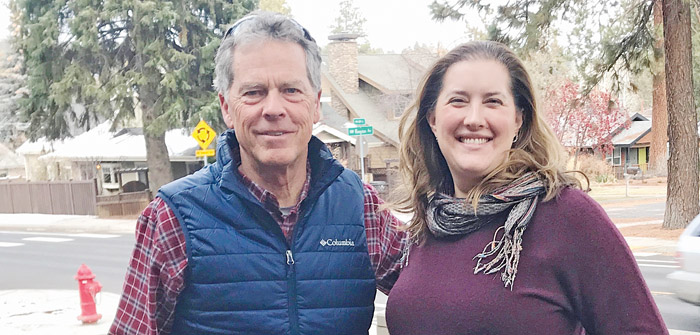(Photo above: Don Bauhofer and Heather McPherson stand outside the Bend CASA office | Photo courtesy of CASA of Central Oregon)
CASA May Have the Answer
“We all decide whether we want to give back — and how to do it. If you can make a difference in young peoples’ lives you make a difference for a lifetime,” said Don Bauhofer, president of the Pennbrook Company, a real estate development company in Central Oregon. “That’s what drives me.”
Court Appointed Special Advocates (CASA’s) are ordinary citizens from all walks of life who have dedicated themselves to protecting the rights of children who have been removed from their parents’ home. Reasons for removal can be anything from neglect to sexual, physical or emotional abuse.
CASA volunteers — after background checks, training and being sworn-in by a judge — make sure that children don’t get lost in the legal and social service system into which they have been thrust.
As volunteers they take neither the parents’ nor the new foster parents’ side, they simply act as a professional community member who is looking at the situation and advocating for what is in the best interest of the child.
The number of foster children is increasing
“As the population in Central Oregon has grown over the last few years so has the number of foster children,” said Heather McPherson, development director with CASA of Central Oregon. Over the course of 2018 about 500 kids have been in foster care in Deschutes, Jefferson and Crook Counties. About 440 of them had their own assigned CASA, the remaining 60 are “monitored” by CASA staff.
Monitoring means that CASA ensures that every foster child is represented throughout the legal process — but assigning a staff member, particularly when staff is lean, is not the same as having a dedicated CASA assigned to the child. “We’ve been pretty fortunate over the last couple of years with the number of CASA volunteers we have,” said McPherson. “I believe it’s the largest number of advocates that we’ve ever had — but we’re still not able to serve all the children.”
So what exactly do CASA volunteers do?
You first need to understand how the social service and legal systems operate when abuse or neglect is reported through a “referral.”
The Department of Human Services (DHS) in coordination with local law enforcement, investigates “referral” reports in a home. These can come from neighbors, family members, police, teachers, doctors, hospitals — anyone who has come into contact with a child and feels that a child is in danger. If it’s determined that abuse or neglect exists, the child is removed from the home immediately and, within 24 hours a “shelter hearing” takes place in which a judge usually grants temporary custody to DHS. The Judge also appoints a lawyer to the child as well as a CASA.
DHS’s responsibility is to find a safe foster home for the child, first with a local relative if possible because it’s better for the child. Emergency foster certification is quicker and easier as well. Within one week there’s another court hearing to determine if the child should become a “ward of the court.” While the goal is always to reunite the child with his or her parents, the remedial steps parents have to take to create a safe environment typically do not happen quickly.
Once the child is in foster care the CASA steps in, with background information provided by DHS and a lawyer, to “soak up” and understand the child’s world. The CASA develops a personal relationship with everyone in the child’s world so that he or she can objectively advocate for the child’s best interests when reporting to the court.
The beauty of being a CASA is that you get to have a relationship with the kids, to make a difference for them that affects the rest of their lives. And you have a direct line of communication with a judge.
Here’s an example
You’re reading the Cascade Business News so you’re likely working for a Central Oregon business — or perhaps you own one. And you’re busy. Work, family, recreation, maybe even a board position with local business.
But there’s something missing, right?
Bauhofer is a busy guy too. (Shoot…he’s the president of the Pennbrook Company in Bend.) “I’ve been on a lot of boards and I felt like I wanted to do something that was more personal, where I wasn’t advising already smart people or helping to fund raise.”
Bauhofer’s been a CASA for four years and has handled about eight cases during that time. “I like to work with families with children early on so you can help them avoid dysfunctional problems,” said Bauhofer. “In my experience, drugs, alcohol and abuse are the main causes of dysfunction within families.”
Bauhofer is satisfied with his “success” rate. “There’s one case that I’m still actively working on, all the other cases have resolved themselves — either the kiddos were adopted or the families were reunited.”
But I’m not trained and don’t have the skills…
Prospective CASA’s are well trained for the task. “It’s extensive training. Forty hours of training over ten weeks and then there’s the volunteer commitment which is generally between ten and fifteen hours a month,” said McPherson. This teaches a volunteer how to investigate, engage and understand all the people and circumstances in a child’s life — including the parents, foster parents, teachers, physicians — and of course — the child.
And skill-wise, well, you’re a business person, right?
“The skills that make a great CASA advocate are some of the same skills that make someone successful in the professional world,” said McPherson. “CASA’s need to be problem solvers, stay focused on the goals of what’s best for the child they serve. It’s a job that requires both the mind and the heart.”
So what’s stopping you?
CASA of Central Oregon needs your skills, your passion and your desire to help children and young people. “Being able to give of yourself is a unique opportunity,” said Bauhofer. “There aren’t, for a business person, those opportunities — you will gain much more than you give.”
And when you are sworn-in by the Deschutes County Circuit Court, Judge Stephen Forte is likely to say to you, “As a CASA, your appointment comes from the court but your calling comes from within.”





